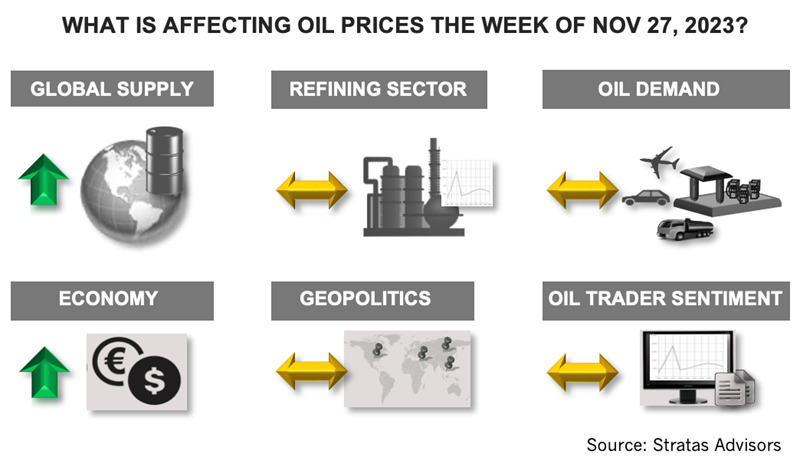The price of Brent crude ended the week at $80.58 after closing the previous week at $80.61. The price of WTI ended the week at $75.54 after closing the previous week at $75.89. The price of DME Oman ended the week at $81.98.

Earlier in the week, oil prices moved upwards, but then fell with the EIA reporting a build in crude inventories (8.70 MMbbl/d) and the news that members of OPEC+ had delayed their meeting scheduled for Nov. 26 because of concerns raised by Angola and Nigeria about supply quotas. It appears that the issue has been resolved and the meeting is now scheduled for Nov. 30. At the meeting we expect that OPEC+ will take steps in managing supply to support oil prices. Before the delay in the meeting, we expected that Saudi Arabia would extend its voluntary production cut through at least the first quarter of next year. We are now expecting that OPEC+ will reduce supply further, in part, because if additional supply cuts are not announced, it is very likely that oil prices will decrease even further, given market expectations surrounding the upcoming meeting.
For the upcoming week, we are expecting that the price of Brent will move upwards but will need to break above its 200-day moving average to move higher than $83.00.
Support for oil prices stems from the following factors:
- The U.S. economy is expected to continue growing through the fourth quarter—although at a slower pace than in the third quarter when the U.S. economy grew by 4.9%. The GDPNow model from the Federal Reserve Bank of Atlanta is currently indicating real GDP growth of 2.1% for the U.S. economy in the fourth quarter.
- We are forecasting that China’s economy will grow by 4.68% (YoY) in the fourth quarter. We are expecting that China will increase fiscal stimulus, in part, to counteract the decreasing confidence of Chinese multinational companies, which based on a recent poll by the Conference Board, has decreased significantly. While the rating is still above 50 (which indicates a positive outlook) the rating has decreased from 72 to 54 during the last six months.
- The U.S. Dollar Index ended last week at 103.40, down from the previous week of 103.92—and dropping below its 200-day moving average. On Nov. 1, the U.S. Dollar Index was 106.88. (A weaker U.S. dollar tends to be positive for the price of oil).
- The U.S. is showing increased attention on enforcing the sanctions associated with the price gap on Russian oil exports. Recently, the U.S. Treasury Department imposed sanctions on three UAE shipping companies that allegedly shipped Russian oil that was priced above the $60 cap. Additionally, in response to the increased attention, four major Greek shipping firms have stopped shipping Russian oil.
- We also still think that the fundamentals remain favorable for higher oil prices. During the fourth quarter, we are forecasting that oil demand will outpace supply by around 900,000 bbl/d.
Conversely, the following factors are putting downward pressure on oil prices:
- The risk associated with the Israeli-Hamas conflict has temporarily been tamped down with the four-day truce between Israel and Hamas and the release of 44 hostages. Furthermore, Hamas has indicated a willingness to extend the truce: however, reaching an agreement to do so could prove difficult, since Hamas is linking the extension to increasing the number of Palestinians detainees to be released by Israel.
- Another factor putting downward pressure on oil prices is the negative sentiment of the oil traders. Traders of WTI have decreased their net long positions by 60% since late September and have fallen back to the levels of early July. During the last eight weeks, traders of Brent have decreased their net long positions by around 30%.
For a complete forecast of refined products and prices, please refer to our Short-term Outlook.
About the Author: John E. Paise, president of Stratas Advisors, is responsible for managing the research and consulting business worldwide. Prior to joining Stratas Advisors, Paisie was a partner with PFC Energy, a strategic consultancy based in Washington, D.C., where he led a global practice focused on helping clients (including IOCs, NOC, independent oil companies and governments) to understand the future market environment and competitive landscape, set an appropriate strategic direction and implement strategic initiatives. He worked more than eight years with IBM Consulting (formerly PriceWaterhouseCoopers, PwC Consulting) as an associate partner in the strategic change practice focused on the energy sector while residing in Houston, Singapore, Beijing and London.
Recommended Reading
Paisie: Oil Demand to Rise 1.2 MMbbl/d in Second Half
2024-07-26 - WTI’s price is expected to stay in the low $80s/bbl.
Repsol to Implement New Share Buyback Program
2024-07-26 - Madrid-based Repsol plans to repurchase and redeem 20 million of its shares in the second half 2024, according to the company’s CEO Josu Jon Imaz.
Woodside to Emerge as Global LNG Powerhouse After Tellurian Deal
2024-07-24 - Woodside Energy's acquisition of Tellurian Inc., which struggled to push forward Driftwood LNG, could propel the company into a global liquefaction powerhouse and the sixth biggest public player in the world.
US Using More, Storing Less NatGas in Summer 2024—EIA
2024-07-24 - Gas storage levels remain high, thanks to record production levels in 2023 and a warmer-than-typical winter.
Texas LNG, EQT Sign a 2-mtpa LNG Tolling Agreement
2024-07-24 - EQT will supply natural gas to Texas LNG, a 4- million tonnes per annum LNG export terminal planned for the Port of Brownsville, Texas.





